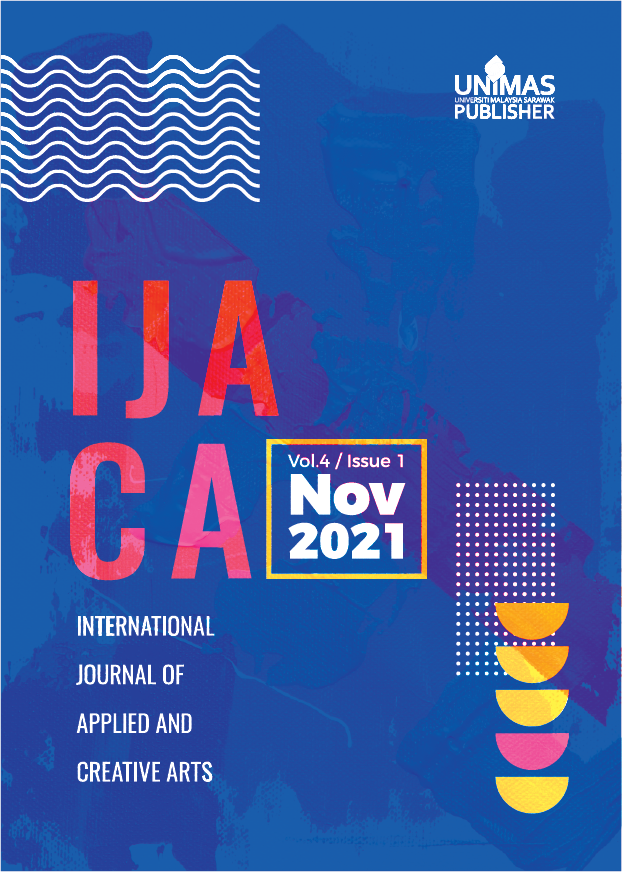THE DUSUN TINDAL RESIDENTS OF LASAU TINTAPON IN KOTA BELUD, SABAH, A TRADITION OF USING ARTEFACT TAJAU
DOI:
https://doi.org/10.33736/ijaca.4213.2021Keywords:
tradition, tajau, use of tajau, evidence, history of tajauAbstract
This research looked into the use of artefact tajau as one of the Dusun Tindal counting traditions. In addition, this report will clarify how this native used the term tajau a century ago. This research also employs a qualitative approach fieldwork method with sources being interviewed to gather evidence. The researcher
was taken to the study site by an informant who is an expert and a traditional chief in the village. This approach is employed so that the researcher can analyze and comprehend the study’s use of the tajau in greater detail. Futhermore, this research demonstrates that tajau has been used since the first war until the
present century.
References
Asdy. A. (2010). Asal Usul Bangsa Bajau. Retrieved from http:aeddyalapbana.blogspot.com/2010/01/asal-usul-bangsa-bajau.html
Fatin, B. (30 July 2015). Sejarah Sistem Barter. Retrieve from http://www.fatinbella.com/2015/07/sejarah- sistembarter.html
Ghani, A, Z. (3 April 2012). Sistem Barter. Retrieve from https://www.slideshare.net/zurainiabdulghani/sistem-barter-12275338
Pensel, S. (2 February 2014). Masyarakat Dusun. Retrieve from https://www.slideshare.net/senyum92/masyarakat-dusun
Radio Rodja. (25 Jun 2018). Larangan Melangkahi Kuburan. Retrieve from https://www.radiorodja.com/31339-larangan-melangkahi-kuburan/
Riadi, M. (21 April 2020). Reward atau Penghargaan (Pengertian, Tujuan, Jenis dan Syarat). Retrieve from https://www.kajianpustaka.com/2020/04/reward-atau-penghargaanpengertian-
tujuan-dan-syarat.html
Sani, K. (4 January 2018). Analisa Kepercayaan Animisme Yang Masih Diamalkan Oleh Masyarakat- Islam di Malaysia. Retrieve from http://kamarulnizamsani.blogspot.com/2018zxb/01/analisa-kepercayaananimisme-
yang-masih.html
Shoanna. (21 December 2014). Keranda Kayu Balak. Retrieve from https://www.slideshare.net/Shoanna94/keranda-kayu-balak-42905995
Utusan Borneo Online. (2019). Kekalkan Adat Istiadat, Warisan Untuk Generasi Akan Datang. Retrieve from https://www.utusanborneo.com.my/201908/19/kekalkan-adat-istiadatwarisan-
untuk-generasi-akan-datang
Banaas Bin Lantukan (58 years old). Ketua Adat and Bekas Ketua Kampung, Kampung Lasau Tintapon. Interviewed on 29 March 2021.
Marusic, M. & Marusic, A. (2009). The purpose of scientific journals: small is important. The Journal of Tehran University Heart Center 4, 143-147.
Downloads
Published
How to Cite
Issue
Section
License
Copyright Transfer Statement for Journal
1) In signing this statement, the author(s) grant UNIMAS Publisher an exclusive license to publish their original research papers. The author(s) also grant UNIMAS Publisher permission to reproduce, recreate, translate, extract or summarize, and to distribute and display in any forms, formats, and media. The author(s) can reuse their papers in their future printed work without first requiring permission from UNIMAS Publisher, provided that the author(s) acknowledge and reference publication in the Journal.
2) For open access articles, the author(s) agree that their articles published under UNIMAS Publisher are distributed under the terms of the CC-BY-NC-SA (Creative Commons Attribution-Non Commercial-Share Alike 4.0 International License) which permits unrestricted use, distribution, and reproduction in any medium, for non-commercial purposes, provided the original work of the author(s) is properly cited.
3) For subscription articles, the author(s) agree that UNIMAS Publisher holds copyright, or an exclusive license to publish. Readers or users may view, download, print, and copy the content, for academic purposes, subject to the following conditions of use: (a) any reuse of materials is subject to permission from UNIMAS Publisher; (b) archived materials may only be used for academic research; (c) archived materials may not be used for commercial purposes, which include but not limited to monetary compensation by means of sale, resale, license, transfer of copyright, loan, etc.; and (d) archived materials may not be re-published in any part, either in print or online.
4) The author(s) is/are responsible to ensure his or her or their submitted work is original and does not infringe any existing copyright, trademark, patent, statutory right, or propriety right of others. Corresponding author(s) has (have) obtained permission from all co-authors prior to submission to the journal. Upon submission of the manuscript, the author(s) agree that no similar work has been or will be submitted or published elsewhere in any language. If submitted manuscript includes materials from others, the authors have obtained the permission from the copyright owners.
5) In signing this statement, the author(s) declare(s) that the researches in which they have conducted are in compliance with the current laws of the respective country and UNIMAS Journal Publication Ethics Policy. Any experimentation or research involving human or the use of animal samples must obtain approval from Human or Animal Ethics Committee in their respective institutions. The author(s) agree and understand that UNIMAS Publisher is not responsible for any compensational claims or failure caused by the author(s) in fulfilling the above-mentioned requirements. The author(s) must accept the responsibility for releasing their materials upon request by Chief Editor or UNIMAS Publisher.
6) The author(s) should have participated sufficiently in the work and ensured the appropriateness of the content of the article. The author(s) should also agree that he or she has no commercial attachments (e.g. patent or license arrangement, equity interest, consultancies, etc.) that might pose any conflict of interest with the submitted manuscript. The author(s) also agree to make any relevant materials and data available upon request by the editor or UNIMAS Publisher.

